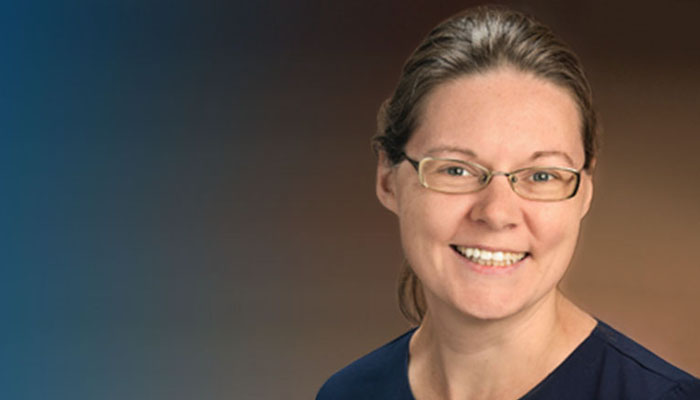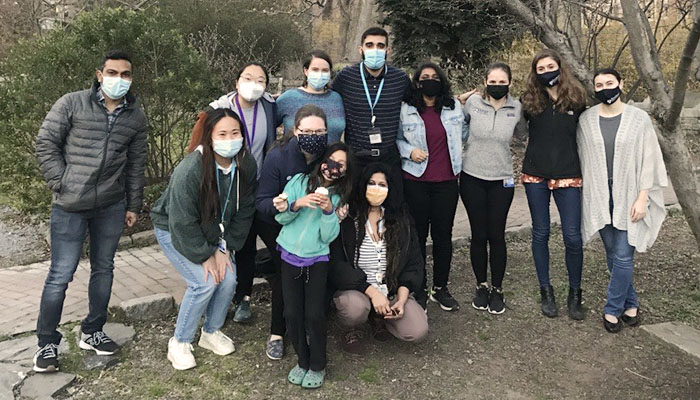HOW CAN WE HELP YOU? Call 1-800-TRY-CHOP
In This Section
‘Progress to Benefit Patients:’ Faculty Spotlight With Elizabeth Bhoj, MD, PhD

Elizabeth Bhoj, MD, PhD
Editor's Note: Welcome to our monthly Faculty Spotlight series, in which we sit down with faculty members at Children's Hospital of Philadelphia Research Institute to learn more about their research and roles. Through these spotlights, our readers meet the diverse, dedicated, and distinctive individuals who lead our research community in our mission to improve children's health. This year, we will be asking our featured scientists about mentorship — why it matters and how it has influenced their careers. In this Q&A, we feature Elizabeth Bhoj, MD, PhD, physician and scientist in the Department Pediatrics and Bhoj Laboratory. Stay tuned for more from our Faculty Spotlight series throughout this year!
How long have you been at CHOP, and tell us about your research specialty?
I came to CHOP as a combined pediatrics/clinical genetics resident in 2010, stayed for a clinical molecular fellowship, spent two years of postdoctoral/instructor time with Hakon Hakonarson, MD, PhD, in the Center for Applied Genomics, then started my lab as a faculty member in 2018.
I spend a lot of time thinking about how to diagnose and treat children with rare genetic disorders, especially neurologic syndromes. Our lab works on a full spectrum of projects in translational human genetics, from novel diagnostic tests, to understanding the mechanism of rare disorders, to testing novel targeted therapies.

Bhoj Lab Fall Party
Why did you choose to focus on that specialty?
I spend about one day a week seeing patients with known or suspected genetic disorders, the majority of whom never get a clear genetic diagnosis, let alone a direct therapy or cure. My dream is to make sure that every patient can have a quick and accurate genetic diagnosis, and targeted therapy. Going back and forth between the clinic and laboratory to reach these goals is very motivating, and I hope we can keep making progress that goes back to benefit the patients.
Can you tell us about a research project that you are excited about?
There are three main projects in my lab that I'm excited about — the first is a collaboration with the Ahrens-Nicklas Lab to use a variety of technologies to find novel pediatric neurodegeneration syndromes. We've been working on the project together for about a year and already have several really interesting leads we're following up now.
We are also working on understanding the mechanism and designing targeted treatments for two neurologic disorders we described previously, caused by mutations in the genes TBCK and Histone 3.3. These two genes have very different roles they play in our body, and we're learning a lot about basic neuroscience from studying them. Ultimately, we're working on treatments I hope we can move to clinical trials sometime soon.
What are the long-term research questions that you hope to answer?
I'd love to learn more about filling in the gaps in diagnosing kids with suspected genetic syndromes. Even with the best technology in the clinic, we can still give a diagnosis to only about half of all kids who we think have a genetic disorder. At the same time, I want to understand how the changes that we do find actually cause disease in these children. And then, when we know these answers, we can start to fix it, which is the most important part to me.
Can you tell us about how mentorship has influenced your career? Why do you believe mentoring is important in science?
I've had so many amazing mentors in my life. I went to a small state school for undergrad with very limited research options, so I was really dependent on a number of mentors reaching out and encouraging me to apply for MD/PhD programs in the first place. My PhD mentor at University of Texas Southwestern Medical Center and Dallas was Andrew Zinn, MD, and he was a wonderfully supportive and encouraging mentor.
At CHOP, Elaine Zackai, MD, has been a continual source of clinical mentorship and expertise since I did a medical student rotation with her almost 15 years ago. Scientifically, Dr. Hakonarson has been an exemplary mentor – I became a translational geneticist because of his support, and his generosity and continued mentorship is one of the big reasons I decided to stay at CHOP as faculty.
Reflecting on mentorship over my career, I think the two most important aspects have been those who helped me decide the best career path, including encouraging me when it was difficult, and then providing resources to be successful. Now that I have my own trainees, I hope I can pay it forward and provide it to others in our lab and beyond.